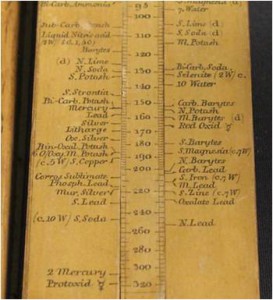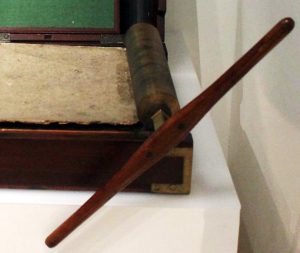 About 250 years ago, science spread into the world and everyday life. People asked how scientific progress and inventions could make life better and easier. They set out to develop and pursue new ideas. Some of these are still around today. In the fourth part of my series, we discover how the invention of a Scottish mechanical engineer changed the office world forever.
About 250 years ago, science spread into the world and everyday life. People asked how scientific progress and inventions could make life better and easier. They set out to develop and pursue new ideas. Some of these are still around today. In the fourth part of my series, we discover how the invention of a Scottish mechanical engineer changed the office world forever.
The Origin of Now (Part 3)
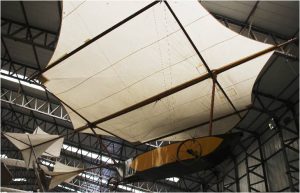 This series is dedicated to inventions, ideas and concepts developed during the Romantic Age that shaped our modern world. With the second scientific revolution, a series of breakthroughs in science led to the idea that scientific progress could make life better and easier. Inventive individuals set out to pursue new ideas (also see part 1 and part 2 of this series). One of them was Sir George Cayley (1773-1857). Follow me back to the 1790ies to find out how his dream of flying laid the foundation of today’s aviation.
This series is dedicated to inventions, ideas and concepts developed during the Romantic Age that shaped our modern world. With the second scientific revolution, a series of breakthroughs in science led to the idea that scientific progress could make life better and easier. Inventive individuals set out to pursue new ideas (also see part 1 and part 2 of this series). One of them was Sir George Cayley (1773-1857). Follow me back to the 1790ies to find out how his dream of flying laid the foundation of today’s aviation.
The Man Who Understood Why Airplanes Fly
Sir George Cayley sketched his first flying machine aged 19, in 1792. Continue reading
The Origin of Now: Part 2
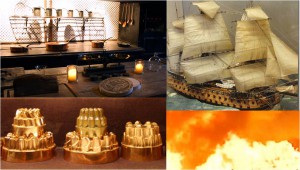 Our modern world was born in the 18th century. Numerous inventions, ideas and concepts developed during the Romantic Age can still be found in our everyday life. In the previous part of this series I had presented roller skates, the steel pen and the financial instrument ‘pfandbrief’ as brainchildren of the 18th century. Today, we discover how a chef and a baronet shaped our world. Continue reading
Our modern world was born in the 18th century. Numerous inventions, ideas and concepts developed during the Romantic Age can still be found in our everyday life. In the previous part of this series I had presented roller skates, the steel pen and the financial instrument ‘pfandbrief’ as brainchildren of the 18th century. Today, we discover how a chef and a baronet shaped our world. Continue reading
The Origin of Now: Part I
Flying, electricity and computers are part of our everyday lives. When their basic principles were explored during the first half of the 18th century, nobody cared about their practical use. The idea that practical use could be made of a balloon ascent, electricity or the binary code was absurd. Science was mainly aimed at understanding the creation and God. Thus, science was practiced in the “ivory towers” of the elite, written down in Latin and kept in libraries of the chosen few.
However, with a series of breakthroughs in astronomy, chemistry and the study of electricity during the Romantic Age, science became popular. It began to spread into the world, as public lectures and subject in schools. People began to ask how scientific progress and inventions could make life better and easier. Inventive persons set out to develop and pursue new ideas. Soon, new machines were introduced to nearly every industry. Some of them were the origin of the world we know today.
In the new series “The origin of Now” Regency Explorer is going to explore the developments, inventions, and concepts of the Romantic Age that laid the foundations of our modern world. I will explore not only scientific and industrial developments, but also innovations in sports, military, the world of finance etc. Find the first set of examples here.
The Girl, the Kite and the Eccentric Inventor
In this post:
Inventions and science in the Romantic Age
Help, my father is an inventor!
Martha Pocock as a character of a novel – and plot bunnies involving the Pocock family
Martha Pocock was not what we associate with a typical girl of the Romantic Age. She was neither an epitome of propriety nor a simpering Miss. Martha had guts and she was hands-on. She was the first woman to be lifted into the air under a kite. Martha owed her experiences in flying under a kite to her father. George Pocock (1774–1843) was an inventor and a schoolmaster. He became famous for inventing the first kite-drawn carriage. Sounds like a joke? It’s not.
What Would Have Been Your Role at the Congress of Vienna 1814/1815?
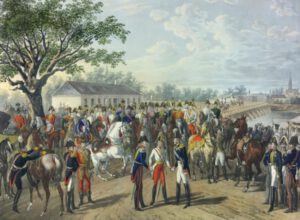 Vienna, 1814. 271,000 people live in the capital of the Austrian Empire. The city is going to host one of the major political events of the early 19th century: The Congress of Vienna. The heads of the five reigning dynasties, representatives from 216 noble families and their entourage travel to Vienna. 16.000 visitors are already arriving in September. More are to follow: plenipotentiaries, ministers, noblemen, servants, musicians, artists, merchants, fortune-hunters and card sharps.
Vienna, 1814. 271,000 people live in the capital of the Austrian Empire. The city is going to host one of the major political events of the early 19th century: The Congress of Vienna. The heads of the five reigning dynasties, representatives from 216 noble families and their entourage travel to Vienna. 16.000 visitors are already arriving in September. More are to follow: plenipotentiaries, ministers, noblemen, servants, musicians, artists, merchants, fortune-hunters and card sharps.
Have a glimpse behind the scenes
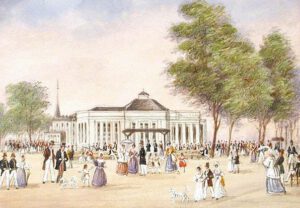 Organising the Congress is a huge task. Regency Explorer takes you behind the scenes as either the Head of the Police Ministry or the Master of Ceremonies and tells you more about the history of the Congress and the tasks that had to be fulfilled.
Organising the Congress is a huge task. Regency Explorer takes you behind the scenes as either the Head of the Police Ministry or the Master of Ceremonies and tells you more about the history of the Congress and the tasks that had to be fulfilled.
First, find out in which role you would have fitted best at the Congress by answering the three questions below. Count your points to get a proper result, and then read on to learn more about the challenges the real historical persons of Baron Hager, Head of the Police Ministry, and Count Trauttmansdorff, Master of Ceremonies, had to face.
Writer’s Travel Guide: Birmingham
I bet you hadn’t expected to read about Birmingham here. London, Bath, Brighton and Gretna Green are the typical locations of a Regency Novel. Besides these, you might find Harrogate and Newmarket, but certainly not Birmingham. But, dear Regency Enthusiast, Birmingham has great potential as a location of your novel. Find out why the town used to attract even the wealthy and aristocratic.

